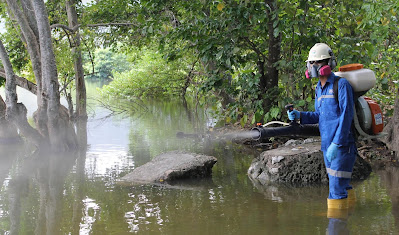 |
| Source: International SOS. Fogging of an area likely to harbour malaria-infected mosquitoes. |
To mark World Malaria Day 2023 (April 25), International SOS has encouraged organisations to support the global effort to invest, innovate and implement to deliver zero malaria.
Malaria continues to occur in more than 80 countries*, causing over 240 million infections each year, and numbers are growing, says International SOS. The World Health Organization estimates there were 2 million more cases of malaria globally in 2021 compared to 2020, while International SOS’ data shows the trend continued in 2022, with the number of requests for assistance related to malaria 10% higher than in 2021.
With the ongoing recovery of international business travel, there is a greater need to ensure protection against malaria for people who may have been exposed, International SOS points out. Business travellers should be aware of malaria as a potential diagnosis - the early symptoms include fever, a headache, and chills.
Global travel also has the potential to reintroduce or increase transmission of malaria in tropical and temperate countries that have currently eliminated or controlled transmission.
Dr Irene Lai, Medical Director at International SOS, commented: “Every organisation should review the malaria risk to their workforce and implement measures to protect them. For those that send employees to malarial areas, this includes education and awareness, pre-travel medical review and preventive supplies, and access to rapid diagnosis and treatment. For those operating in locations where malaria circulates, this should include surrounding communities through an integrated malaria control programme.”
Dr Dave Knight, a medical doctor and Malaria Specialist at International SOS, added: “Malaria cases and deaths have actually risen during the pandemic, and globally we seem to have lost some traction in controlling malaria. For the private sector, malaria remains a key health risk when operating in the tropics, especially in Africa and parts of Asia and South America. It is predicted with climate change that this risk could grow.
"Furthermore, there are no ground-shifting technology solutions imminent over the next few years that will allow significant mitigation of this risk in a company workforce. We still rely on the age-old interventions. On a positive note, the new RTS,S vaccine is being rolled out in high transmission areas in Africa in infants and young children. It is not suitable for adults yet provides moderate but important protection to very young children over the first few years of life. The private sector should support this initiative in communities within which they operate where appropriate.”
International SOS advises that business travellers to do a pre-travel risk assessment of their destination, and understand the symptoms and signs of malaria as well. If travelling to a malaria-prone area, they should mitigate the risk with suitable accommodation, and know when and how to take their emergency standby medication:
1. Review the malaria-risk to their workforce and if operating in malaria-prone areas, implement an integrated malaria control programme
2. Educate employees on the risk of malaria and the importance of personal protection measures against mosquito bites using the ABCDE approach.
- Awareness: be Aware of the risk and the symptoms.
- Bite prevention: avoid being bitten by mosquitoes.
- Chemoprophylaxis: if prescribed for, use chemoprophylaxis (antimalarial medication) to prevent infection.
- Diagnosis: immediately seek diagnosis and treatment if a fever develops one week or more after being in a malarial area
- Emergency: carry an emergency standby treatment (EST) kit if available and recommended
3. Provide preventive supplies such as insect repellent and anti-malarial drugs
4. Offer employees travelling to malarial areas access to pre-travel medical reviews and destination travel risk-assessments
5. Ensure travelling employees choose accommodations with a bed net, air-conditioning and screening on doors and windows
International SOS also provides consulting services for every part of a company’s malaria risk mitigation programme, including experienced entomology consulting, assessment and design vector control programmes, e-learning to educate employees, medical consulting to ensure proper diagnostic and treatment pathways and data management, as well as ensuring a programme is well managed.
Explore
Watch the associated short video at https://vimeo.com/798944207.
*2020 OECD figures state that malaria-endemic countries in Asia Pacific include Papua New Guinea, Solomon Islands, Pakistan, India, Nepal, the Philippines, Indonesia, Myanmar, the Lao PDR, Cambodia, Thailand, DPR Korea, China, Vietnam, Bangladesh, the Republic of Korea and Malaysia.